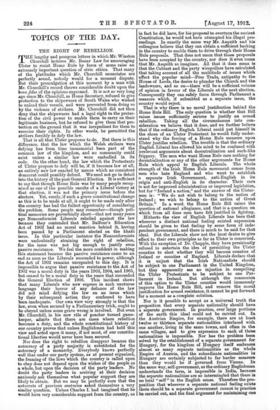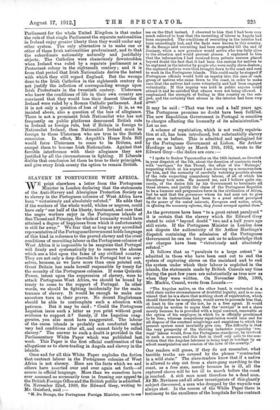TOPICS OF THE DAY.
THE RIGHT OF REBELLION.
THE lengthy and pompous letters in which Mr. Winston Churchill lectures Mr. Bonar Law for encouraging Ulster to resist Home Rule by force of arms raise an extremely important question of civic ethics. That many of the platitudes which Mr. Churchill enunciates are perfectly sound, nobody would for a moment dispute. But their promulgation at this moment by a man with Mr. Churchill's record throws considerable doubt upon the bona fides of the opinions expressed. It is not so very long ago since Mr. Churchill, as Home Secretary, refused to give protection to the shipowners of South Wales who wished to unload their vessels, and were prevented from doing so by the violence of strikers. Mr. Churchill did not then deny that the shipowners had a legal right to the protec- tion of the civil power to enable them to carry on their legitimate business, but he refused to give them that pro- tection on the ground that it was inexpedient for them to exercise their rights. In other words, he permitted the strikers forcibly to defy the law.
That is all that Ulster proposes to do. But there is this difference, that the law which the Welsh strikers were defying has from time immemorial been part of the common law of the kingdom, and no community could exist unless a similar law were embodied in its code. On the other hand, the law which the Protestants of Ulster propose to defy will be, if it becomes law at all, an entirely new law enacted by means which no consistent democrat could possibly defend. We need not go in detail into the history of the past General Election. It is sufficient to say that though Home Rule was by many people recog- nized as one of the possible results of a Liberal victory at that election, it was not the primary issue before the electors. Yet, surely, if such a grave constitutional change as this is to be made at all, it ought to be made only after the country has had the fullest opportunity of considering the problem. Some people may remember—though poli- tical memories are proverbially short—that not many years ago Nonconformist Liberals rebelled against the law because they contended that Mr. Balfour's Education Act of 1902 had no moral sanction behind it, having been passed by a Parliament elected on the khaki issue. In this particular instance the Nonconformists were undoubtedly straining the right of rebellion, for the issue was not big enough to justify even passive resistance. We feel the more confident in making this statement because the passive resistance came to an end as soon as the Liberals succeeded to power, although the Act of 1902 remains unrepealed to this day. It is impossible to argue that passive resistance to the Act of 1902 was a moral duty in the years 1903, 1904, and 1905, but ceased to be a moral duty in the years that succeeded the General Election of 1906. This incident shows that many Liberals who now express in such unctuous language their horror of any defiance of the law did not mind defying the law on an issue which by their subsequent action they confessed to have been inadequate. Our own view very strongly is that the law, even when secured by a Parliamentary trick, ought to be obeyed unless some grave wrong is involved. But even Mr. Churchill, in his new role of poacher turned game- keeper, admits that there are cases where rebellion becomes a duty, and the whole constitutional history of our country proves that unless Englishmen had held this view and acted upon it many, if not most, of our constitu- tional liberties would never have been secured.
Nor does the right to rebellion disappear because the autocracy of a party majority is substituted for the autocracy of a monarchy. Everybody knows perfectly well that under our party system, as at present organized, the framing of the laws which the country is called upon to obey does not depend upon the wishes of the people as a whole, but upon the decision of the party leaders. No doubt the party leaders in arriving at their decision anxiously ask themselves what popular support they are likely to obtain. But we may be perfectly sure that the autocrats of previous centuries asked themselves a very similar question. Unless Charles I. had imagined that he would have very considerable support from the country, as in fact he did have, for his proposal to overturn the ancient Constitution, he would not have attempted his illegal pro- ceedings. In exactly the same way Mr. Asquith and his colleagues believe that they can obtain a sufficient backing in the country to enable them to drive through their Home Rule proposals. That does not mean that those proposals have been accepted by the country, nor does it even mean that Mr. Asquith so imagines. All that it does mean is that the Cabinet and the party wirepullers have calculated that taking account of all the multitude of issues which affect the popular mind—Free Trade, antipathy to the House of Lords, the desire to plunder the Church and the landowners, and so on—there will be a sufficient volume of opinion in favour of the Liberals at the next election. Consequently they can safely force through Parliament a. measure which, if submitted as a separate issue, the country would reject.
That is why there is no moral justification behind the Home Rule Bill. The only question is whether that Bill raises issues sufficiently serious to justify an armed rebellion. Taking all the circumstances into con- sideration we believe that it does, and we further believe that if the ordinary English Liberal could put himself in the shoes of an Ulster Protestant he would fully under- stand why the forcing of a Home Rule measure upon Ulster justifies rebellion. The trouble is that the ordinary English Liberal has allowed his mind to be confused with irrelevant arguments about decentralization and such-like frippery. The men who want Home Rule care nothing for decentralization or any of the other arguments for Home Rule which appeal to English Liberals. The whole strength of the Irish Home Rule movement comes from men who hate England and who want to establish a separate Irish Government, anti-English in its origin and anti-English in its character. Their care is not for improved administration or improved legislation, but for "Ireland a nation," and the answer of the Ulster- men is : " We do not wish to belong to the nation of Ireland ; we wish to belong to the nation of Great Britain." In a word. the Home Rule Bill raises the question of national allegiance, and that is a question on which from all time men have felt justified in fighting.
Hitherto the view of English Liberals has been that wherever a distinct national feeling existed expression should be given to that feeling by some form of inde- pendent government, and there is much to be said for that ideal. But the Liberals show not the least desire to give effect to their own principles as far as Ulster is concerned. With the exception of Dr. Chapple, they have persistently refused to entertain the idea of permitting the Ulster counties to elect whether they will become counties of Ireland or counties of England. Liberals declare that it is unjust that the Irish Nationalists should be subject to one Parliament in the United Kingdom, but they apparently see no injustice in compelling the Ulster Protestants to be subject to one Par- liament in Ireland. But although the concession of this option to the Ulster counties would immensely improve the Home Rule Bill, and remove the moral justification for armed resistance, it cannot be put forward for a moment as a complete solution.
Nor is it possible to accept as a universal truth the proposition that every separate nationality should have a separate government. In practice, over large portions of the earth this ideal could not be carried out. In the Austrian Empire, for example, there are at least twelve or thirteen separate nationalities interlaced with one another, living in the same towns, and often in the same villages, and to give expression to each of these nationalities is impossible. Nor has the problem been solved by the establishment of a separate government for Hungary, for the kingdom of Hungary itself embraces almost as many separate nationalities as the whole Empire of Austria, and the subordinate nationalities in Hungary are certainly subjected to far harder measure than they would be if governed from Vienna. In the same way, self-government, as the ordinary Englishman understands the term, is impossible in India, because the separate nationalities are so intermingled that there is no local " self " in the English sense. Therefore the pro- position that wherever a separate national feeling exists there should be a separate government cannot in practice be carried out, and the final argument for maintaining one Parliament for the whole United Kingdom is that under the rule of that single Parliament the separate nationalities in Ireland enjoy greater liberty than they would under any other system. The only alternative is to make one or other of these Irish nationalities predominant, and to that the subordinate nationality naturally and justifiably objects. The Catholics were shamelessly downtrodden when Ireland was ruled by a separate parliament as a Protestant colony in the eighteenth century ; and it is from that period that Irish Nationalists derive the hatred with which they still regard England. But the wrongs done to the Irish Catholics in the eighteenth century do not justify the infliction of corresponding wrongs upon Irish Protestants in the twentieth century. Ulstermen who know the conditions of life in their own country are convinced that they would lose their dearest liberties if Ireland were ruled by a Roman Catholic parliament. And it is not only a question of loss of liberty. It is, as we insisted above, also a question of the loss of allegiance. There is not a prominent Irish Nationalist who has not frequently on public platforms denounced British rule in Ireland as foreign rule, but if Britain is foreign to Nationalist Ireland, then Nationalist Ireland must be foreign to those Ulstermen who are true to the British connexion. In effect, Mr. Asquith's Home Rule Bill would force Ulstermen to cease to be Britons, and compel them to become Irish Nationalists. Against that forcible interference with their allegiance they are justified by all the circumstances in fighting. If Liberals dislike that conclusion let them be true to their principles, and give every Irish county the option to remain British.







































 Previous page
Previous page